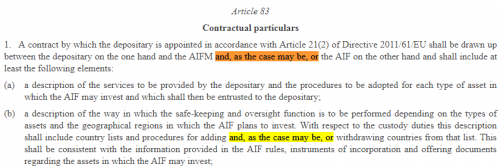And/or
In a Nutshell™, “and/or” means “or”, because “or” includes “and”.
|
Towards more picturesque speech™

|
In brief
Never use and/or. It is the lawyer’s equivalent of having a damp kipper handshake.
In tedious detail
“and/or” crops up often in mediocre drafting. It has a face only a mother could love. It is borne of the quite unjustified fear that when contemplating a list of alternatives the occurrence of any of which leads to an certain outcome, one’s plans in that regard might somehow come unstuck if they all occur.
There is no grounds for this fear. Logically, this is how one defines and and or:
- “And” is a logical operator which gives the value one if and only if all the operands are one, and otherwise has a value of zero.
- “Or” is a logical operation which gives the value one if at least one operand has the value one, and otherwise gives a value of zero.
And/or is not just ugly; it’s defeatist, because of the presence of the virgule, that whoreson slash, which is not even a part of idiomatic punctuation in the English language. It’s a decoration. It has no fixed grammatical meaning. That slash admits that the plain, punctuated words of the English language have defeated you.
In fact, that slash means - and can only mean - “or”. So by saying “and/or” you are really saying “and, or or”. But to be hermetically sealed and consistent, shouldn’t you make one further clarifying step, and say “and, and/or or”?
AND DO YOU NOW SEE THE INFINITE REGRESSION YOU HAVE SET IN MOTION?
Go back to your draft and strike all examples, and we shall never speak of this again.
Published on LinkedIn
See also
Plain English Anatomy™ Noun | Verb | Adjective | Adverb | Preposition | Conjunction | Latin | Germany | Flannel | Legal triplicate | Nominalisation | Murder your darlings